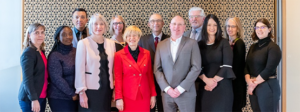Saturday, February 16, 2019 ~ NATIONAL.
~ West Shore Voice News
New technology, artificial intelligence, and global competitiveness are changing the way Canadians work.
“Many of the skills needed for good quality jobs will change in the years to come. A Canadian workforce that incorporates new technology and adapts is key to Canada’s long-term economic growth,” it was stated in a Department of Finance news release on February 14.
This week, the Honourable Patty Hajdu, Minister of Employment, Workforce Development and Labour, along with the Honourable Bill Morneau, Minister of Finance, announced the Future Skills Centre and Future Skills Council. It’s part of the Government’s plan to ensure that all Canadians have the skills to find and keep good quality jobs and grow the middle class.
Ryerson University, the Conference Board of Canada and Blueprint were selected to partner and operate Canada’s new Future Skills Centre.
The Government of Canada is investing $225 million over four years, and $75 million per year thereafter, in Future Skills.
The Future Skills Centre will operate at arm’s length from the Government of Canada to fund projects across Canada that develop, test and measure new approaches to skills assessment and development.

Fifteen members from Canada’s public, private, labour and not-for-profit sectors were selected to form the Future Skills Council. The selection process was an open call that was merit-based and took into consideration regional, cultural and gender diversity.
The Council will provide advice to the Minister of Employment, Workforce Development and Labour on emerging skills and workforce trends including national and regional priorities related to skills development for Canadians. The Council will be co-chaired by Valerie Walker, Executive Director of the Business/Higher Education Roundtable (BHER) and Dr. Thierry Karsenti, Director of the Centre de recherche interuniversitaire sur la formation et la profession enseignante (CRIFPE).
“The world of work is changing and Canadians need to be equipped to seize the opportunities this presents,” says Hajdu. “Future Skills is part of the Government’s plan to build an agile workforce that can find and keep good, well-paying jobs, and strengthen the middle class so that everyone has a fair chance at success – today and tomorrow.”
“Canada’s economy is growing and jobs are being created by Canadians every day, but the skills needed to succeed in those jobs can sometimes change rapidly,” says Morneau. “The Future Skills Centre and Council will work with schools, businesses and government to make sure Canadians can learn those skills, helping them stay competitive in tomorrow’s job market.”



